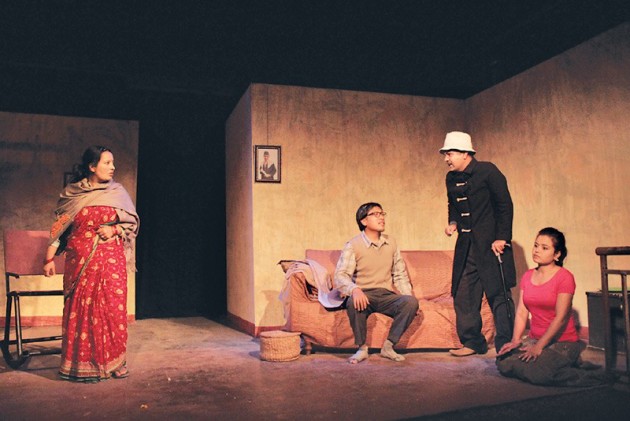Still Hungry: Bahadur Malla’s Bhoko Ghar asks if things have changed at all
 Timothy Aryal, Kathmandu / Dec 24: Picture a dingy, dimly-lit hovel that houses nothing but a famished and an agonised family, desperately seeking an escape. That is exactly what Bhoko Ghar (The Starving Home) opens with. The family of four continually dreams of fleeing from their immediate conundrum. And just like its characters, the play Bhoko Ghar—currently on at Theatre Mall—seeks to flee from tragedy by embracing satire and comedy. Throughout the 65-minute long play, both the characters and the audience oscillate between moments of deep-seated and evocative tragedy of the situation and the absurd yet comic follies of the protagonists.
Timothy Aryal, Kathmandu / Dec 24: Picture a dingy, dimly-lit hovel that houses nothing but a famished and an agonised family, desperately seeking an escape. That is exactly what Bhoko Ghar (The Starving Home) opens with. The family of four continually dreams of fleeing from their immediate conundrum. And just like its characters, the play Bhoko Ghar—currently on at Theatre Mall—seeks to flee from tragedy by embracing satire and comedy. Throughout the 65-minute long play, both the characters and the audience oscillate between moments of deep-seated and evocative tragedy of the situation and the absurd yet comic follies of the protagonists.
Authored by Govinda Bahadur Malla ‘Gothale’, in the 1980s, Bhoko Ghar highlights the deepening ridge between the state and the public of the time. It sheds light into a society trapped between the empty promises of the rhetoric-laden Panchayat state and the ground reality of its own disillusioned citizens. So it is intriguing that four decades later, with this current adaptation, the producers are asking the obvious question—have things changed at all?
Directed by Kedar Shrestha, Bhoko Ghar has been reproduced to suit the current social trajectory of the country, and examines the ever-widening gap between those who have and those who have not. And in doing so, the play tries to get to the root of this problem that has plagued the country, and indeed human civilisation, since it began.
During the play, a classic graduationon photograph of the unemployed son of the family—Rajendra (Sudham CK), glares at the audience from the wall. Clearly lost in his own ivory tower, Rajendra is oftentimes prone to digressing into a monologue, or two, about how the haughty promises of socialism might help his family get by.
The father, Narabahadur (Aakash Magar) has recently lost his job, dragging the family into the current state of poverty. Resolved to find a solution to their despair, he is constantly plotting the next big idea, however absurd; roping in humour as the antidote to the tragedy.
Sarita (Sanjita Sanji), the daughter, resorts to reciting and enacting her favourite folklore as a means of escape. At one point she narrates a section where a monster feeds off human flesh: Rakshyasle manchhe ko masu khairachha—as she continues to starve. However, it is only the mother (Shanti Giri) who seems obsessed with the hunger itself.
The point the play tries to make comes home with the introduction of Tanka Man (Abhaya Baral) towards the conclusion of the play. Tanka is a middle-aged, affluent creditor, and a tormenter to the family. At that point, the audience is able to see that Sarita’s monster in Tanka Man, who embodies the ruling class feeding off the poor in the society.
While presenting the story, director Kedar Shrestha has employed a minimal stage design, apt for a family struggling to get by. The tattered walls, and the well-placed lighting, further enhance the setting and the storytelling.
All in all, Bhoko Ghar, although set in a time past, highlights the disparity between the two polar classes that still exists in the society we live in today. The play, minimal yet thought-provoking, through its current rendition, is a great extrapolation of our society that continues to remain mired in tall promises that never seem to be quite fulfilled, especially if you live on the wrong side of the tracks.
Bhoko Ghar is being staged at Theatre Mall every day (except for Wednesday) at 5 pm. Source: The Kathmandu Post
